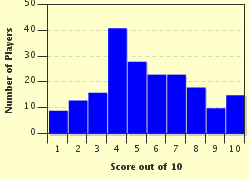Quiz Answer Key and Fun Facts
1. Who was Elizabeth Bennett's plain and studious sister in Jane Austen's "Pride and Prejudice"?
2. Who was the eldest sister in Shakespeare's play "King Lear"?
3. In "East of Eden" by John Steinbeck, who was Cal Trask's sibling?
4. In the Bible, is it true that Cain sold his inheritance for a bowl of pottage?
5. In Shakespeare's "As You Like It", who is Orlando's sibling rival?
6. Who was the younger sister in Shakespeare's "The Taming of the Shrew"?
7. Who was the foster brother of Moses in the Bible?
8. Anne Shirley of the famous "Anne of Green Gables" series of books has seven children by the time the series is complete. Who was the second born son of this brood?
9. In Shakespeare's "Richard III" who was Richard's kingly brother whose death sparked the story that followed?
10. In the Bible, which of Jacob's wives competed with her sister for the love of their husband?
Source: Author
Creedy
This quiz was reviewed by FunTrivia editor
agony before going online.
Any errors found in FunTrivia content are routinely corrected through our feedback system.


